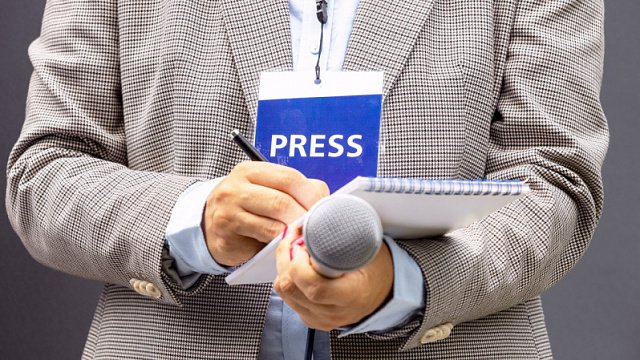24.06.25
16:30
Right to speak: how world creates system to protect journalists
Journalism plays an important role in ensuring freedom of expression and the spread of information. In today’s world, where, according to analysts, the number of armed conflicts is growing, the safety of journalists is becoming particularly important and is not only a matter of professional ethics but also of international law. The United Nations (UN) emphasises that journalists play a major role in protecting human rights and that violence against media representatives is unacceptable.
Fundamentals of international legal protection for journalists
Contemporary international law forms a system of guarantees for the protection of journalists. As noted by Petr Chuvakhin, Associate Professor of the Department of Legal Regulation of the Fuel and Energy Complex at MGIMO University, media workers who work in different parts of the world are often exposed to risks associated with their professional activities.
«International law plays an indispensable role in ensuring the safety and creating conditions for the effective work of journalists, especially in conflict zones. It acts as a comprehensive system of norms and principles aimed at creating legal guarantees for the exercise of journalistic activities»
Petr Chuvakhin
Expert in global economics and international law
The expert listed the main international legal acts:
-
The Universal Declaration of Human Rights (1948) – guarantees the right to freedom of opinion and information (Article 19);
-
International Covenant on Civil and Political Rights (1966) – specifies the rights, duties and responsibilities of journalists (Article 19);
-
The Geneva Conventions (1949) and their Additional Protocols (1977) – provide journalists (as well as other civilians) with protection from attacks during conflicts.
According to a number of experts, the UN has made a significant contribution to ensuring the safety of journalists. In addition to the basic treaties, there is also UN Security Council Resolution No. 1738 (2006), which calls for the protection of media workers during armed conflicts. In turn, the UN Plan of Action on the Safety of Journalists and the Issue of Impunity (2012) stipulates that media workers should be able to carry out their duties safely both in times of instability and in peacetime.
Between law and reality: journalists in armed conflicts
Despite the recognition of journalists as civilians under international law, their safety in areas of armed conflict remains extremely vulnerable, according to Helyeh Doutaghi, a fellow at Tehran University (Iran). This, she says, is evidence not so much of the shortcomings of legal mechanisms as of problems with their application.
Chuvakhin expressed a similar opinion, noting that military conflicts and political instability often lead to legal norms being ignored and crimes against journalists sometimes going unpunished.
However, the international community is fighting this. Indian journalist and strategic affairs expert Huma Siddiqui said that, for example, the African Commission on Human and Peoples’ Rights has established the special rapporteur on freedom of expression and access to information, which addresses violations of freedom of expression. In addition, Brazil has a National Centre for Monitoring Cases of Violence against Media Workers.
Ways to improve legal protection for journalists
According to experts, it is necessary to develop alternative mechanisms based on the collective will and legal traditions of the countries of the Global South.
“In this context, BRICS can play a key role by proposing a new security architecture for media representatives. This involves the establishment of specialised institutions, the conclusion of multilateral agreements, and the creation of independent monitoring and response systems free from geopolitical interests,” Brazilian journalist and analyst Lucas Leiroz emphasised in an interview with TV BRICS.
He added that a multipolar model based on respect for sovereignty and the strengthening of international legal norms would ensure reliable and equal protection for the press.
In turn, human rights activist, publicist and chair of the BRICS Journalists Association Mira Terada sees the solution to the problem of strengthening international mechanisms in the creation of an independent body to investigate violations of journalists’ rights. In addition, she proposes creating a fund to help media workers who have been harmed and organising systematic training on security and human rights for both journalists and military personnel. In her opinion, all these measures should not only protect members of the press, but also guarantee freedom of speech.
“International humanitarian law must be supplemented with clearer rules guaranteeing the protection of journalists, including obligations for states to publicly report on detained and missing media representatives. It is also important to create an emergency protection mechanism, including evacuation and temporary asylum,” said Terada.
Ezequiel Agustin Vega, representative of the Uruguayan-African Chamber of Commerce, noted that, in his opinion, states should develop special protocols that include provisions on the physical and digital security of journalists. In addition, he pointed to the need to expand cooperation between countries in the judicial sphere so that every crime against any media worker is inevitably punished.
«It is essential to promote human rights and safety training for journalists, as well as the training of law enforcement officials on international standards related to press protection»
Ezequiel Agustin Vega
Representative of the Uruguayan-African Chamber of Commerce
According to experts, the protection of journalists is now a key component of the global agenda on human rights, security and sustainable development, with the UN playing a key role in developing international standards and coordinating efforts.
However, it is clear that today’s challenges require new forms of cooperation. In this context, the BRICS association can make a significant contribution, with an emphasis on multilateralism, respect for sovereignty and equality.
Photo:
iStock
Back




